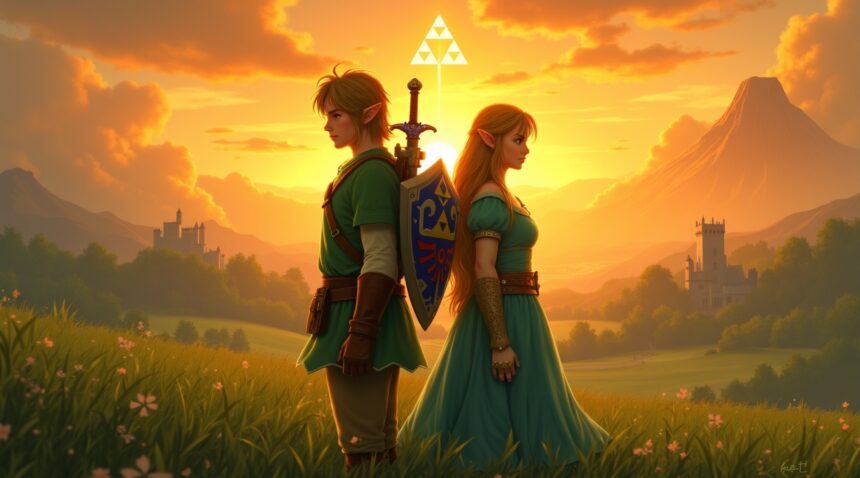Nintendo has officially confirmed that Benjamin Evan Ainsworth will portray Link and Bo Bragason will play Princess Zelda in the live-action adaptation of The Legend of Zelda, directed by Wes Ball and slated for theatrical release on May 7, 2027.
Key Takeaways
- Benjamin Evan Ainsworth (best known for The Haunting of Bly Manor) will star as Link, while Bo Bragason (The Jetty, Renegade Nell) takes on the role of Princess Zelda. The casting has sparked widespread discussion among fans about the potential character dynamics and interpretations.
- Director Wes Ball, famed for The Maze Runner series, will lead the cinematic vision. T.S. Nowlin is writing the screenplay. Nintendo remains heavily involved, with majority financial control and Shigeru Miyamoto producing in collaboration with Marvel producer Avi Arad.
- The film’s release has been shifted from March to May 7, 2027. This six-week delay allows additional time for production and post-production to meet the standards aligned with Nintendo’s historic legacy and fan expectations.
- Sony Pictures will handle global distribution, following a model similar to the one which contributed to the commercial success of The Super Mario Bros. Movie, which earned $1.3 billion worldwide. Nintendo retains substantial creative direction over how Hyrule is brought to life on screen.
- The plot centers around the eternal struggle featuring Link, Princess Zelda, and the dark villain Ganon in their battle over the mythical Triforce. While detailed story elements remain under wraps, fans continue to speculate how closely the adaptation will adhere to the beloved lore of the video game franchise.
Benjamin Evan Ainsworth and Bo Bragason Cast as Link and Princess Zelda
The live-action Legend of Zelda movie officially found its heroes when Nintendo announced that Benjamin Evan Ainsworth will portray Link and Bo Bragason will take on the role of Princess Zelda. Nintendo and series creator Shigeru Miyamoto revealed these casting decisions through social media on July 16, 2025, marking a significant milestone for the highly anticipated film adaptation.
The Chosen Actors’ Backgrounds
Benjamin Evan Ainsworth brings considerable acting experience to the iconic role of Link. British audiences recognize him from his compelling performance in “The Haunting of Bly Manor,” where he demonstrated his ability to handle complex emotional material. His voice work as Pinocchio in Disney’s 2022 live-action remake showcased his talent for bringing beloved characters to life, making him an intriguing choice for the largely silent but expressive hero of Hyrule.
Bo Bragason steps into the royal shoes of Princess Zelda with her own impressive portfolio of work. The British actress has proven her range through diverse projects including:
- “The Jetty”
- “Renegade Nell”
- “The Radleys”
Her experience across different genres suggests she can handle both the regal authority and adventurous spirit that Princess Zelda embodies throughout the game series.
Fan Reception and Online Discussion
The casting announcement sparked immediate and passionate reactions across fan communities online. Some enthusiasts expressed excitement about the fresh faces bringing new interpretations to these beloved characters, while others voiced concerns about how closely the actors match their expectations of Link and Zelda’s appearances. This type of casting controversy isn’t uncommon for video game adaptations, as seen with other recent projects like the live-action Pokemon series announcements.
The debate highlights the challenge filmmakers face when adapting characters that players have visualized in countless ways across multiple game iterations. Each fan carries their own mental image of what Link and Zelda should look like, making it nearly impossible to satisfy every expectation. However, the focus on acting ability rather than physical resemblance suggests the production team prioritizes performance over pure aesthetic matching.
Both actors face the unique challenge of bringing video game characters to life while honoring the source material that has captivated millions of players worldwide. Their performances will ultimately determine whether these casting choices prove inspired or controversial among the fanbase.
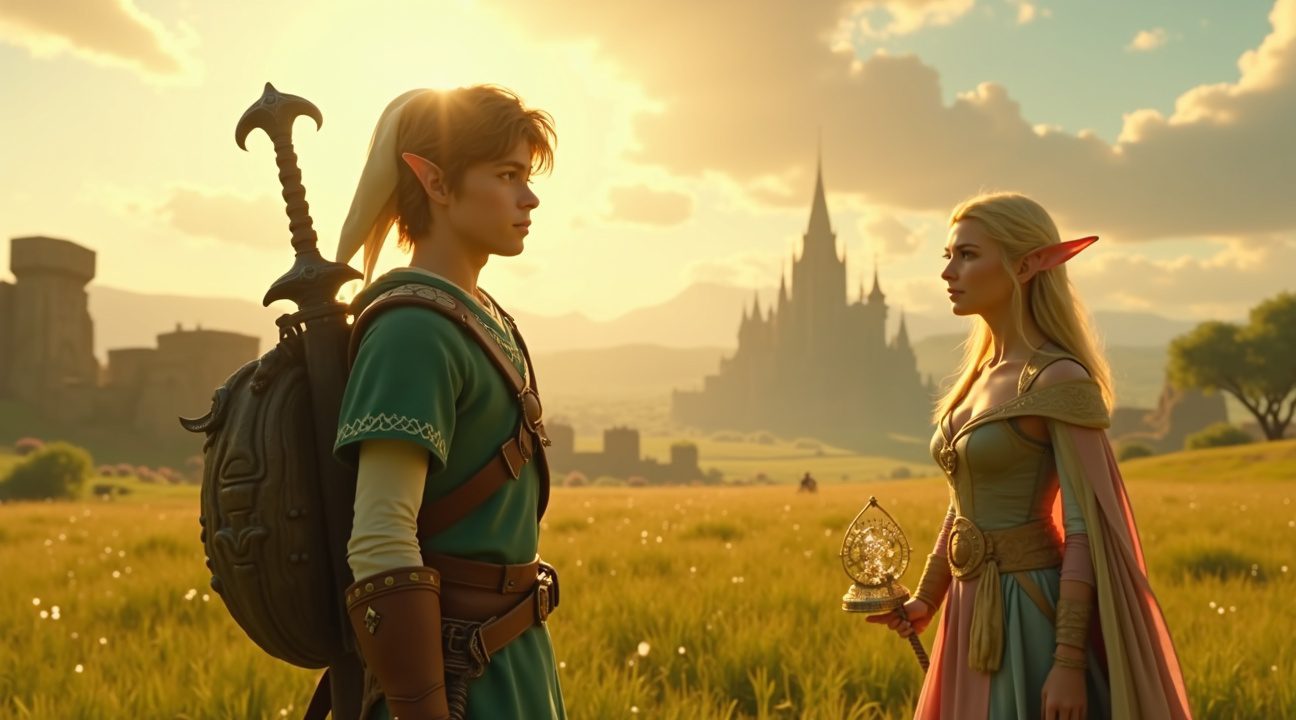
Wes Ball Directs with Nintendo and Sony Pictures Co-Production
The Legend of Zelda movie has assembled an impressive creative team that brings together established filmmaking talent with gaming industry expertise. Wes Ball, known for directing “The Maze Runner” series and “Kingdom of the Planet of the Apes,” takes the helm of this ambitious adaptation. His experience with action-adventure narratives and visual storytelling makes him a compelling choice for bringing Hyrule’s epic tales to the big screen.
Proven Screenplay and Production Talent
T.S. Nowlin handles screenplay duties after replacing Derek Connolly in the writing process. Nowlin’s previous work includes “The Maze Runner” and “The Adam Project,” demonstrating his ability to craft stories that blend adventure elements with character development. This collaboration between Ball and Nowlin represents a reunion that could leverage their established working relationship from “The Maze Runner” franchise.
The production team combines gaming industry leadership with Hollywood experience. Shigeru Miyamoto, Nintendo’s legendary game designer and creator of the Zelda series, serves as producer alongside Avi Arad. Arad’s extensive background includes:
- Former CEO and founder of Marvel Studios
- Producing credits for the “Spider-Man” franchise
- Producer of the “Uncharted” film
This partnership ensures both authentic representation of the source material and commercial filmmaking expertise.
Financial Structure and Distribution Strategy
Nintendo maintains significant control over the project by holding more than 50% of the financial stake, while Sony Pictures provides co-financing. This arrangement allows Nintendo to protect their intellectual property while benefiting from Sony’s film production resources and distribution network. Sony Pictures will handle worldwide distribution, giving the movie access to global theatrical markets and the studio’s marketing infrastructure.
The financial structure reflects Nintendo’s commitment to quality control after their Super Mario Bros. movie success. By maintaining majority ownership, Nintendo can ensure the film aligns with their vision for the franchise while Sony provides the necessary industry experience to reach mainstream audiences. This collaborative approach mirrors successful video game adaptations that balance fan expectations with broader entertainment appeal.
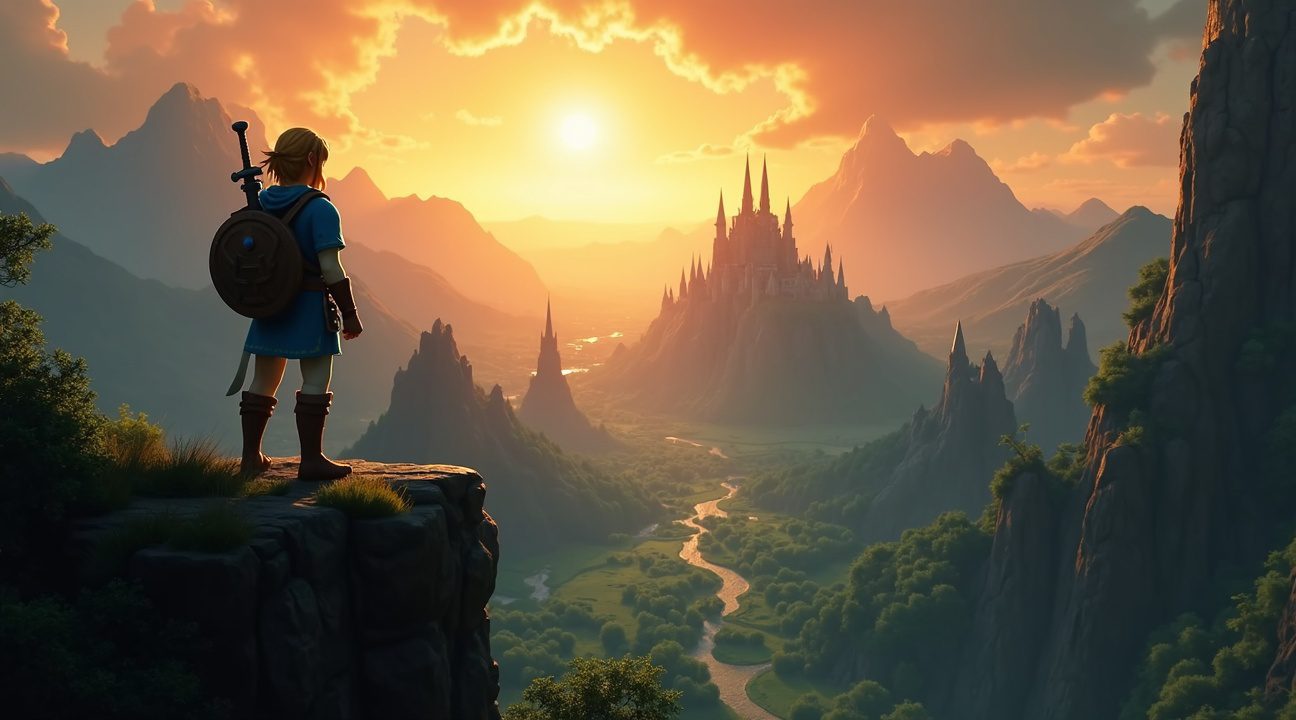
May 2027 Release Date Following Production Delay
The live-action Legend of Zelda movie has officially locked in a release date of May 7, 2027, marking a significant shift from its original timeline. I’ve been tracking this production closely, and the delay represents more than a simple scheduling adjustment—it reflects the careful approach Sony Pictures and Nintendo are taking with this highly anticipated adaptation.
Production Timeline Adjustments
Initially slated for March 26, 2027, the film experienced a six-week pushback that industry insiders attribute to production considerations rather than creative differences. This type of strategic delay often signals a studio’s commitment to quality over rushed delivery, particularly important given the passionate fanbase surrounding the Legend of Zelda franchise. The extra time allows filmmakers to refine special effects, complete additional shooting if necessary, and ensure the final product meets both Nintendo’s standards and fan expectations.
Sony Pictures’ decision to move the release date suggests they’re prioritizing a polished final product over meeting an arbitrary deadline. Given the mixed reception many video game adaptations have received historically, this cautious approach could prove beneficial. The company likely wants to avoid the pitfalls that have plagued other game-to-film transitions, learning from both successes and failures in the genre.
Global Distribution Strategy
Sony Pictures will handle international distribution for the Legend of Zelda film, positioning it for a worldwide theatrical release. This global approach mirrors successful strategies employed for other major franchise films, ensuring simultaneous release across key markets to:
- Maximize impact
- Minimize piracy concerns
The international distribution deal represents a significant investment in the property’s commercial potential.
The May 2027 release date places the film in prime summer blockbuster territory, competing alongside other major tentpole releases. This positioning indicates Sony’s confidence in the project’s box office potential, as studios typically reserve premium release slots for their most promising properties. The timing also allows the film to capitalize on summer moviegoing habits when families and younger demographics—core Zelda audiences—are most likely to attend theaters.
With Sony managing global distribution, the film gains access to established international marketing networks and theater relationships that independent distributors might struggle to secure. This infrastructure becomes particularly crucial for a property like Zelda, where international markets represent substantial revenue opportunities. The collaboration between Nintendo’s creative oversight and Sony’s distribution expertise could establish a template for future video game adaptations, similar to how other successful franchises like Super Mario Bros have benefited from strategic studio partnerships.
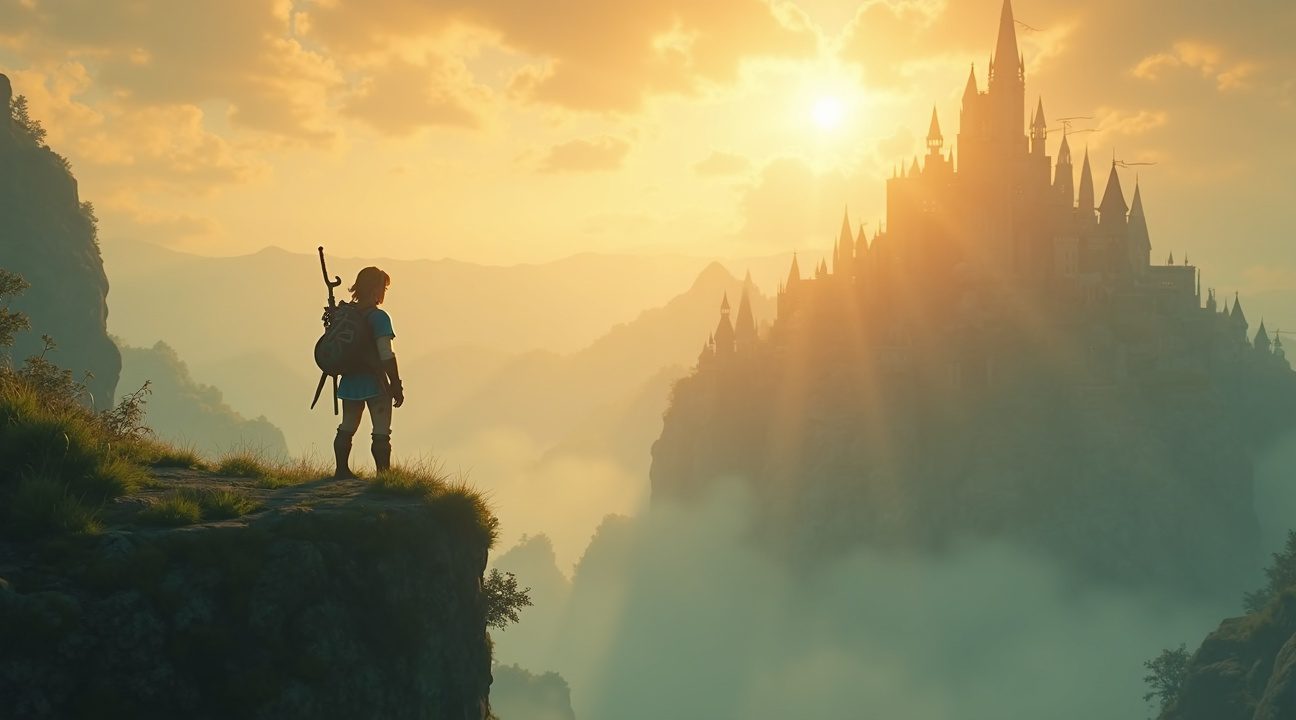
Building on Super Mario Bros Movie’s $1.3 Billion Success
Nintendo’s venture into cinema has already proven remarkably profitable with the Super Mario Bros Movie‘s staggering success. The animated adaptation shattered expectations by earning over $1.3 billion worldwide at the box office, establishing a powerful precedent for future video game adaptations. This financial triumph has given Nintendo the confidence and resources to expand its cinematic universe aggressively.
I see Nintendo’s strategy clearly emerging as they simultaneously develop multiple film projects across both animated and live-action formats. The company isn’t content with single-project success; they’re building a comprehensive entertainment division that mirrors their gaming dominance. This expansion includes various beloved franchises from their extensive catalog, positioning Nintendo as a major player in Hollywood alongside their established gaming empire.
Producer Lineup Ensures Quality Control
The producer selection for the Zelda project demonstrates Nintendo’s commitment to maintaining quality standards while maximizing commercial appeal. Avi Arad brings extensive experience from successful superhero franchises, while Shigeru Miyamoto‘s involvement ensures authentic representation of the source material. Their collaboration represents a strategic balance between Hollywood expertise and Nintendo’s creative vision, similar to the approach that made Mario’s cinematic debut so successful.
Miyamoto’s hands-on involvement particularly signals Nintendo’s determination to protect their intellectual property integrity. His role extends beyond typical producer duties, functioning as a creative guardian who understands the intricate details that make Zelda special. This level of oversight helped Mario avoid the pitfalls that have plagued previous video game adaptations, and I expect similar protective measures for Link’s big-screen debut.
The financial backing from Mario’s success provides the Zelda production with substantial resources and reduced studio pressure. Studios often interfere with creative decisions when projects face budget constraints, but the Mario windfall has given Nintendo significant leverage in negotiations. This freedom allows the creative team to focus on crafting an authentic Zelda experience rather than compromising for mass appeal.
Nintendo’s expanding film division suggests they’re planning a long-term cinematic strategy rather than capitalizing on short-term trends. The company has already announced interest in adapting other franchises, indicating they view entertainment media as a permanent extension of their business model. This approach mirrors successful transmedia strategies employed by Marvel and Disney, suggesting Nintendo recognizes the value of cross-platform storytelling.
The timing of the Zelda announcement capitalizes perfectly on Mario’s momentum while avoiding direct competition. Nintendo has spaced their film releases strategically, allowing each project to dominate its respective release window without cannibalizing their own success. This calculated approach demonstrates sophisticated understanding of market dynamics and audience attention spans.
I observe that Nintendo’s producer choices also reflect learning from their previous licensing mistakes with the 1993 Super Mario Bros film. That disaster taught them valuable lessons about maintaining creative control and selecting appropriate partners. The current producer lineup suggests they’ve applied those lessons effectively, choosing collaborators who respect the source material while bringing necessary cinematic expertise.
The success of Mario has also validated Nintendo’s approach to video game adaptations, proving that faithful adaptations can achieve both critical acclaim and commercial success. This validation encourages bold creative choices for Zelda rather than safe, generic approaches that typically characterize video game movies. The financial cushion allows the team to take calculated risks that could elevate the entire genre.
Nintendo’s film division expansion indicates they’re positioning themselves as a long-term competitor to established entertainment conglomerates. The company possesses decades of beloved characters and stories, providing an extensive library for future adaptations. This intellectual property wealth, combined with proven commercial viability, positions Nintendo favorably for sustained success in multiple entertainment sectors.
The Zelda project benefits enormously from Mario’s groundwork in establishing Nintendo’s cinematic credibility. Audiences now associate Nintendo films with quality entertainment rather than the typical skepticism surrounding video game adaptations. This improved reputation provides the Zelda team with a head start in audience acceptance and marketing momentum.
Hyrule’s Epic Story of Link, Zelda, and Ganon Comes to Life
Nintendo has kept specific plot details under wraps, but I expect the film to draw heavily from the foundational elements that made the original 1986 game series legendary. The story will center on Link and Princess Zelda as they unite to save the kingdom of Hyrule from the dark forces of Ganon, creating a classic good versus evil narrative that has captivated gamers for decades.
The Triforce Takes Center Stage
The struggle for the Triforce will likely form the movie’s central conflict. This mystical artifact, representing Power, Wisdom, and Courage, has been the driving force behind countless Zelda adventures. I anticipate the film will explore how each character embodies one aspect of the Triforce:
- Ganon’s quest for power
- Zelda’s wisdom as ruler
- Link’s unwavering courage as the hero
The artifact’s ability to grant wishes to whoever possesses all three pieces creates natural dramatic tension and high stakes that translate perfectly to cinema.
Bringing Hyrule’s Rich Lore to the Big Screen
The adaptation faces the exciting challenge of translating decades of game lore into a cohesive film narrative. I believe the movie will showcase Hyrule’s diverse landscapes, from the peaceful village beginnings to treacherous dungeons and mystical forests. The filmmakers will need to balance honoring the source material while creating something accessible to newcomers.
Character dynamics will play a crucial role in the film’s success. Link’s traditionally silent protagonist nature in games presents an interesting adaptation challenge, though I suspect the movie will give him dialogue while maintaining his heroic essence. Princess Zelda’s evolution from damsel in distress to powerful ruler and magic wielder in recent games suggests the film will portray her as an active participant rather than a passive character waiting for rescue.
Ganon’s portrayal offers rich storytelling possibilities, whether as the humanoid Ganondorf or his more monstrous Ganon form. I expect the film to explore his motivations beyond simple villainy, potentially delving into his tragic backstory as the last male Gerudo and his corruption by power. This depth could elevate the movie beyond typical fantasy fare.
The movie’s connection to other successful video game adaptations becomes relevant here, much like how Nintendo’s animated approach proved successful with recent projects. However, I anticipate this live-action format will allow for more mature themes and complex character development.
The film will likely incorporate iconic elements that fans expect:
- Master Sword ceremonies
- Dungeon exploration sequences
- Puzzle-solving moments
- Epic boss battles
I believe the challenge lies in making these game mechanics feel natural within a film narrative rather than forced references.
Music will undoubtedly play a significant role, given the series’ legendary soundtracks. I expect the film to feature orchestral arrangements of beloved themes like “The Legend of Zelda Main Theme” and “Zelda’s Lullaby,” creating emotional connections for longtime fans while establishing atmosphere for newcomers.
The movie’s approach to magic systems and fantasy elements will set the tone for potential future installments. I anticipate practical effects combined with CGI to bring Hyrule’s magical world to life, from Link’s various tools and weapons to the mystical powers wielded by both heroes and villains.
Given the source material’s episodic nature across multiple timelines, the film will likely establish its own continuity while respecting core mythology. I expect this approach will allow creative freedom while maintaining the essential spirit that makes The Legend of Zelda timeless. The movie represents not just an adaptation but a chance to introduce Hyrule’s magic to an entirely new audience through cinema.
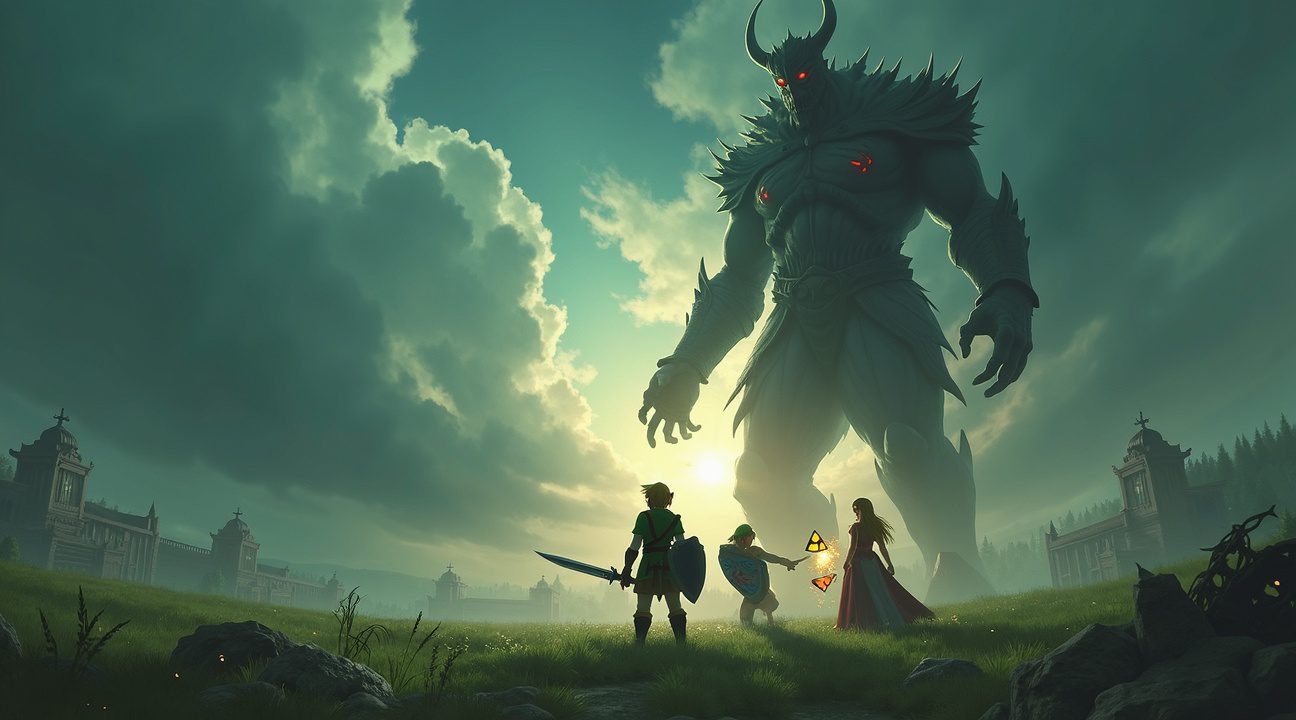
Fan Community Divided on Casting and Adaptation Challenges
The announcement of a live-action Legend of Zelda film has ignited passionate discussions across fan communities, with opinions sharply divided between anticipation and apprehension. Many enthusiasts express concerns about maintaining the series’ core identity while translating it to live-action format.
Critical Adaptation Elements Under Scrutiny
Fans are particularly vocal about several key adaptation challenges that could make or break the film’s success:
- Link’s characteristically silent protagonist nature and how dialogue will be handled
- Zelda’s role evolution from classic damsel-in-distress to empowered leader
- Visual representation of Hyrule’s fantastical landscapes and creatures
- Musical score adaptation from the beloved game soundtracks
- Combat choreography that captures the series’ distinctive sword-and-shield gameplay
The casting debate has become especially heated, with fans scrutinizing every potential actor choice against their mental image of the iconic characters. Some argue that unknown actors might better serve the roles, while others advocate for established stars who can bring gravitas to the fantasy elements.
Source material selection presents another contentious issue. Different games in the franchise offer vastly different tones—from the darker atmosphere of Twilight Princess to the vibrant aesthetics of Breath of the Wild. Each potential direction carries its own fan base and expectations. The choice will fundamentally shape whether the film leans into epic fantasy drama or maintains the series’ more whimsical elements.
Concerns extend beyond casting to fundamental storytelling approaches. Link’s traditional silence has been a defining characteristic, yet live-action films typically require dialogue-driven narratives. Fans worry about how screenwriters will handle this transition without losing the character’s mystique or the player’s connection to him.
The film industry’s track record with video game adaptations adds another layer of skepticism. Recent successes like Super Mario Bros have shown promise, but many fans remember decades of disappointing game-to-film translations. This history makes the Zelda community particularly protective of their beloved franchise.
Visual effects present both opportunities and risks. Advanced CGI technology could bring Hyrule to life spectacularly, but fans fear over-reliance on digital effects might diminish the series’ timeless charm. The balance between practical and digital elements will likely determine whether the film feels authentic or artificial.
Nintendo’s involvement provides some reassurance, as the company maintains strict quality control over its intellectual properties. However, questions remain about how much creative input they’ll have versus traditional Hollywood production methods. The success of recent projects like Pokemon adaptations suggests careful collaboration between game developers and filmmakers can yield positive results.
Ultimately, the film’s reception will depend on striking a delicate balance between honoring the source material and creating compelling cinema that appeals to both longtime fans and newcomers to the franchise.
Sources:
ESPN – “Nintendo Confirms Stars for Live-Action Legend of Zelda Movie”
GameSpot – “The Legend of Zelda Live-Action Movie: Release Date, Cast, and Everything We Know About the Nintendo/Sony Movie”
Backstage – “Legend of Zelda Live-Action Film”
CBC – “Legend of Zelda Live-Action Cast”
Game Informer – “Live-Action Legend of Zelda Movie Delayed by a Few Weeks”
MovieWeb – “Nintendo Just Botched the Live-Action Legend of Zelda Casting”
Nintendo Fandom – “Untitled The Legend of Zelda Film”

